Finding the dragon within
- Koreen Liew-Young
- Jul 26, 2017
- 8 min read
Updated: Oct 16, 2021
I delivered this speech at New Zealand Chinese Association's Going Bananas conference 19 July 2009, and have uploaded this to make reference to in upcoming blogs. Please bear in mind, the content (which has been tweaked slightly to make relevant for today) was written over ten years ago, and my journey of identity has evolved as well as my view on how I see myself as being Chinese in New Zealand. I used to identify as a "banana"...but now I disagree with identifying myself as being "yellow on the outside and white on the inside". But you'll have to read my other blogs to see how my thinking has evolved.
Good morning everyone. I just wanted to thank the New Zealand Chinese Association for inviting me to speak. Today I'm going to be sharing my journey with you, to give you some insight as to how the Winter Camp impacted my life.

I was born in Porirua, and grew up in Hawkes Bay - in primary school, I was a pretty happy kid, as all my peers accepted me for who I was. At intermediate I was all of a sudden, on the receiving end of racial comments, starting off with a boy who I liked, and he liked me, but didn't want to be my boyfriend because I was Chinese. This really threw me, as it made me feel like I was an alien in a place that was my home. I didn't see anything different about me other than the colour of my skin and hair.
To me, being Chinese meant getting parent approval...the only way was to be the best.
To be the best, academically, sports, the arts - standing out for all the "right" reasons. And I looked at myself at how I ranked in terms of the other kids, at prize givings, how many awards did I get. And that's how I got my sense of worth. But no matter how hard I tried, i never felt I measured up to my parents expectations.
After high school, I went down to Wellington to do a Bachelor of Design. One of my tutors asked me if I knew Chinese, I said no. He said I should be doing everything that I could to research it. I struggled with this because I felt I had no connection to it. I didn't know the language, didn't know the culture. From then on, I used every assignment to research what it meant to be Chinese in New Zealand.
And with the help of Nigel Murphy, I came across the New Zealand Poll tax. A 10 pound head entry tax to restrict Chinese people entering New Zealand in the late 1800's, which was soon increased to 100 pounds. I researched and came across poll tax certificates, racial cartoons. This stirred up a lot of buried emotions, of resenting being Chinese because of being stereotyped, and the works I produced were either angry, tortured, or sad (see some of the artwork below). I even went to one point in one of my artworks telling Helen Clark we didn't need her pity money. I just want to thank my aunt Alison Wong, who'd I go visit and she'd listen to me rant and rave about my identity crisis. She'd already walked my journey many years earlier and helped me process all this "stuff" I was feeling.

How Chinese do I feel?
As I said before, I didn't know the language, didn't know the culture, and the only connection I had to China was my face and a trip in 1988 where my whole family went to our ancestral home villages. Dad would say to me "be thankful for your ancestors and the sacrifices they made in coming to New Zealand, otherwise you could be a little peasant running around the rice paddy fields." This didn't mean much, and I would just laugh it off.
I disliked how being Chinese just seemed about money, having the best career (in order to have money) either a doctor, a dentist or lawyer, nothing creative at all. And having a Chinese partner, which all came back to getting parent approval. And if you wanted to be something out of that mould, then it was unheard of and would bring shame to the family name and the entire Chinese community would know about it within five minutes.
This brings me to the ideas of Winter Camp...
Where young Chinese New Zealanders go on a five week trip to China arranged by the New Zealand Chinese Association (NZCA) to get a taste of your roots. But I knew the real secret. It's actually where Chinese parents send their "banana kids" in the last resort to get them to marry a chinese person.
So I played along. Hey Mum, Dad. How about sending me on that winter camp. Maybe I'll meet my future husband.
So I went to China. The biggest group to have ever gone with Janet Joe of 40 people, around 20 males and 20 females, so the ratio was looking very good for Mum and Dad. And funnily enough, getting to know some of the other people, I found I had a similar upbringing to the others. What? No way, you had to work for the family business over Christmas and New Years too?? I thought I was the only one!!

As soon as we got there, we were immersed into Chinese Kung Fu straight away, Five days of intense training at the Wong Fei Hung Martial Arts Academy. It was foreign to me, yet I could find myself adapting to it, having a background in dance. Growing up, Kung Fu was always cheesy, with badly dubbed over voices with warriors cutting off arms and legs and blood splurting out everywhere. But through this, I had so much more respect for the art. The amount of hours they dedicate to it, how beautiful it was to watch and then trying it for yourself, you realise that it's not as easy as they make it look.
Another element was going back to the ancestral home villages. (This is visiting actual houses that our ancestors lived in.) We walked into the "Wong" village (Gwah Leng) and my cousin was excited about meeting up with her relative. Little did I know, who would walk in, but someone who I'd met as my own relative on my trip of "88". It felt so surreal seeing him, what 21 years later. I whipped out the photographs I'd brought and showed him, his eyes lit up. Meeting the other relatives, there was another familiar face, shown in the picture above. From then on , we were taken around our "Wong" house and treated as if we were their own children. The neighbours walk in, "who's this?" "Oh this is Doris and Henry's granddaughter!" (All in Chinese). They'd sit down and join in on the conversation. This really threw me. All my life, I've wanted to blend in with New Zealand culture and lose the Chinese side of me, and here was my relatives on the other side of the world, who wanted to embrace me! We also went to see my great great grandfather and great grandfathers grave, where I was very humbled standing at the foot of the people responsible for giving me a better life.

We headed to the "Young" village, (Poon Yu) and we met up with an aunt who had visited New Zealand 17 years ago. She speaks no english, but is so excited to see me, Se takes me through the village and we go with a translator, showing me the house my grandparents used to live in. I'm gobsmacked. I whip out my photos, and it's the same place, same backyard. There's still a photo of my great grandfather on the wall. I've got a tin of egg cakes whom I'm apparently supposed to give to the last relative alive in the village. We knock on the door, and I think it's my grandfathers cousin? ( Turns out later I find out she was my grandfathers sister.) She's so funny, I ask to take a photo with her, and she complains that she hasn't done her hair. Later on I discover she is actually the same relative in the photo from our trip in 1988 on the very far left!
Upon leaving my aunt Lai Wa and her daughter at the bus stop, she gives me a jacket and a jersey for the journey ahead to Shanghai and Beijing because she didn't want me to be too cold. I just start to cry. My father had told me she is so poor and despite not being able to communicate in the same language, actions spoke louder than words. I wondered how can she love me so much that she would sacrifice the money she didn't have?
The rest of the journey, the tea houses, buddhas, the markets (both legal and illegal) the Great Wall of China and bit by bit you're discovering more and more of this place you had an idea of, but now experiencing it for yourself.
I mean, all the stuff I used to hate in New Zealand.
The crazy asian driving! Over there, somehow it works. It's organised chaos. And now I'm not ashamed to admit I'm also guilty of this crime.
Crazy food, like insects on a stick - taro and red bean flavoured EVERYTHING.
The fashion sense and haircuts... It became the "in" thing to get a china haircut. On return to NZ I have always gone to a chinese hairdresser and never looked back. It's a whole lot easier on the pockets at $20 a cut. And don't get me started on personal hygiene. Squatters were the ultimate experience. You always had to make sure you had hand sanitiser, tissues and always, always did number #2s at the hotel.
How do I feel about being Chinese in New Zealand now?
I left thinking God had made a mistake in making me Chinese, but returned feeling beautiful in my own skin. I mean, I still didn't feel I related to my experience in China, but I had a sense of where I'd come from. And I was completely humbled because I was actually thankful to be in New Zealand. It was like, China was my anchor and now I was free to be me in Aotearoa. Turns out after a fight with my parents over money and careers, Mum enlightened me on some information she'd never shared before. I find out my Goong Goong (granddad) never had a proper bed until his was married. He would work all day in the fruit shop and go upstairs to sleep on a cardboard box. And my Mum never bought any new clothes growing up, she either sewed her own or had hand-me-downs because they were poor. So understanding the focus on careers was a survival tactic, to give future generations a better life, I found myself wanting to embrace my "Chineseness".
Even though I'm 5th generation Chinese Zealander, there's still things engrained in me that are specifically Chinese. Like saving your best clothes for going out, leaving your shoes at the door. And I think it would be nice to find someone that has had the same upbringing as you, although I still think mixed babies are very beautiful! And Mum and Dad have changed their stance on a future son-in-law. They are open to discussion.
Once secure in your identity, you'll stop comparing yourself to others.
For example, at the moment I'm competing in women's club league, grading for nationals and I've had to break through the mentality of comparing myself to other players. My teammates are pacific islanders, Maori or Kiwi European. I am the smallest in my team and for a while I wished, I was taller or a bigger build.
What I've come to realise, is that there's nothing I can do to change my body shape, or my height. And that I've got to look at the strengths I have, instead of what I don't. Yes I'm a smaller build, but I'm fast, and with my good jump and good technique, I can still be competitive.
So in summary, it's the same with being Chinese. I'm still a work in progress, but I got to be happy in my own skin. And I only was able to do so after a lot of soul searching and a trip to China.
If you're thinking about going on NZCA Winter Camp, do it (or send your kids on it). I had a life changing journey with a lot of cool people, and you might even, meet your future husband or wife!
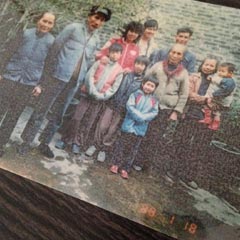
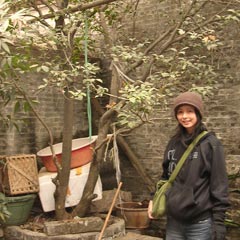
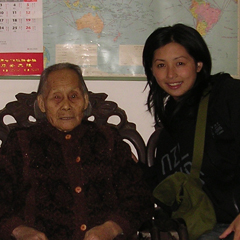
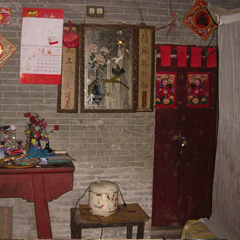
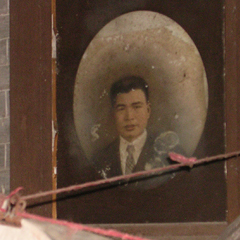
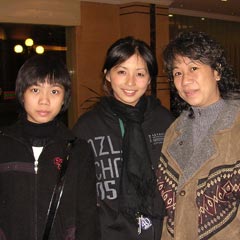


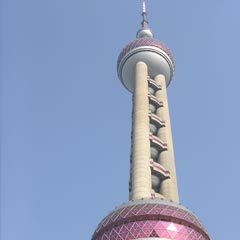







Comments